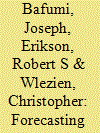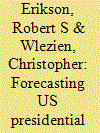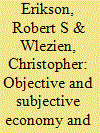|
|
|
Sort Order |
|
|
|
Items / Page
|
|
|
|
|
|
|
| Srl | Item |
| 1 |
ID:
100777


|
|
|
|
|
| Publication |
2010.
|
| Summary/Abstract |
In this article, we present a forecast of the 2010 midterm House election based on information available in early July 2010. We combine this forecast with a note of caution, explaining why electoral circumstances might lead our forecast to err. Finally, we present guidance regarding how to update the electoral forecast for 2010 based on new information that will become available leading up to Election Day.
|
|
|
|
|
|
|
|
|
|
|
|
|
|
|
|
| 2 |
ID:
149328


|
|
|
| 3 |
ID:
131656


|
|
|
| 4 |
ID:
178980


|
|
|
|
|
| Summary/Abstract |
Public responsiveness to policy is contingent on there being a sufficient amount of clear and accurate information about policy available to citizens. It is of some significance then, that there are increasing concerns about limits being placed on media outlets around the world. We examine the impact of these limits on the public’s ability to respond meaningfully to policy by analyzing cross-national variation in the opinion–policy link. Using new measures on spending preferences from Wave 4 of the Comparative Study of Electoral Systems, merged with OECD data on government spending and Freedom House measures of press freedom, we assess the role of mass media in facilitating public responsiveness. We find evidence that when media are weak, so too is public responsiveness to policy. These results highlight the critical role that accurate, unfettered media can play in modern representative democracy.
|
|
|
|
|
|
|
|
|
|
|
|
|
|
|
|
| 5 |
ID:
134791


|
|
|
|
|
| Summary/Abstract |
This article presents a forecast of the 2014 midterm House election based on information available four to six months in advance. The approach builds on our forecasts of the 2006 (Bafumi, Erikson, and Wlezien 2008) and 2010 (Bafumi, Erikson, and Wlezien 2010a,b) midterm elections. 1 We incorporate information about the national forces at work in the election, which are evident early in the election year from generic congressional polls plus the party of the president. We also incorporate information about the districts themselves, which is reflected in their partisan predispositions and in other ways, most notably, whether the incumbent seeks reelection. To forecast the 2014 election, we simulate the national vote and district outcomes using the past as our laboratory, details about which we provide in the text that follows.
|
|
|
|
|
|
|
|
|
|
|
|
|
|
|
|
| 6 |
ID:
116456


|
|
|
|
|
| Publication |
2012.
|
| Summary/Abstract |
The importance of the economy in US presidential elections is well established. Voters reward or punish incumbent party candidates based on the state of the economy. The electorate focuses particularly on economic change, not the level of the economy per se, and pays more attention to late-arriving change than earlier change. On these points there is a good amount of scholarly agreement (see e.g., Erikson and Wlezien 1996; Hibbs 1987). There is less agreement, however, on what specific indicators matter to voters. Some scholars rely on income growth, others on GDP growth, and yet others on subjective perceptions (see Abramowitz 2008; Campbell 2008; Holbrook 1996b; also see Campbell and Garand 2000). In our work, we have used the index of leading economic indicators, a composite of ten variables, including the University of Michigan's index of consumer expectations, stock prices, and eight other objective indicators.
|
|
|
|
|
|
|
|
|
|
|
|
|
|
|
|
| 7 |
ID:
103360


|
|
|
|
|
| Publication |
2011.
|
| Summary/Abstract |
Numerous studies have demonstrated a weakening identification of voters with political parties in Western Europe over the last three decades. It is argued here that the growing proportion of voters with weak or no party affinities has strong implications for economic voting. When the proportion of voters with partisan affinities is low, the effect of economic performance on election outcomes is strong; when partisans proliferate, economic conditions matter less. Employing Eurobarometer data for eight European countries from 1976 to 1992, this inverse association between partisanship and the economic vote is demonstrated. This finding implies a growing effect for the objective economy on the vote in Europe. It helps explain an important puzzle in the economic voting literature: Weak results in aggregate level cross-national studies of economic voting may be attributable to characteristics of the electorate, not just to the characteristics of government.
|
|
|
|
|
|
|
|
|
|
|
|
|
|
|
|
| 8 |
ID:
152855


|
|
|
|
|
| Summary/Abstract |
J. ALEXANDER BRANHAM, STUART N. SOROKA, and CHRISTOPHER WLEZIEN examine the influence of economic “haves” and “have-nots” on public policy decisions in the United States. They and that the middle class, the rich, and the poor almost always agree on policies. When they disagree, the rich win only slightly more often. They conclude that the rich may matter more than they seemingly should but they do not dominate policymaking.
|
|
|
|
|
|
|
|
|
|
|
|
|
|
|
|
|
|
|
|
|